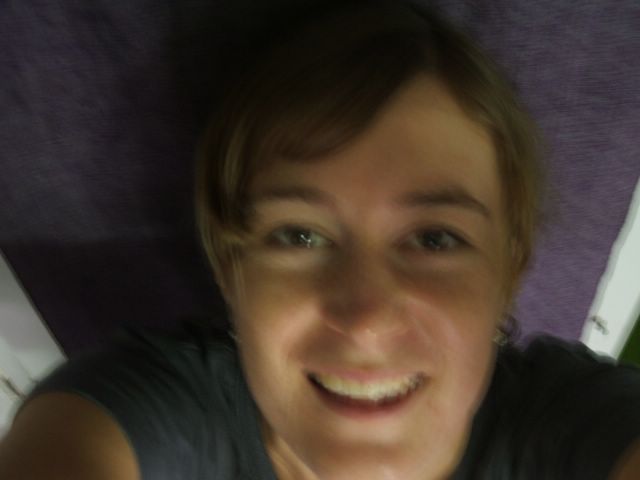coca cola and incense
It’s been an interesting day. It’s only midday and already I feel awash with thoughts and different observations. My morning started with my alarm at 7.15. I had given myself an extra 15 minutes sleep-in time as it wasn’t strictly necessary that I be in at work at my usual 7.30am starting time. Mechanically, I was out of bed and in the shower and musing about my upcoming day. I was listening to Cortez the Killer, thinking about how it is my grandmother’s birthday today and my brother's birthday was yesterday. He is going out for dinner with his new girlfriend and my parents tonight. Suddenly, I am filled with an awful sadness; I am not in Melbourne, Mr B and I can’t join them for dinner. I hop out of the shower and automatically locate some work clothes, I muse about what I would be doing if I was in Melbourne.
Today is a special day at work. We are all heading out to the Kandal seed centre for an opening celebration of the seed company. The event is to celebrate the four seed centres merging into one, and the fact that from the point of registration, the company will be a real company under Cambodian law. Our timing is perfect, we arrive just as the monks do. We are ushered into the seed centre which is a large warehouse with the seed processing and cleaning machinery and a small office upstairs at the far end of the building. A large blue plastic sheet has been laid down on the cement floor of the warehouse and a raised platform has been erected, covered in rugs where the five monks settle themselves.

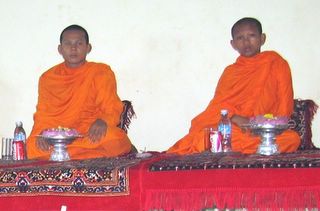
I am invited to sit right at the front of the blue plastic. As usual, I would prefer to sit unobtrusively at the back, but my colleagues refuse. I notice that all the women are sitting at the front, as are all the barang. The chanting begins. The five monks are swathed in the usual bright orange cloth attire and sit quietly on the platform. In front of each is a silver plate with a glass, a bottle of water and a can of coke. I take in the incense, flowers, monks and coca cola. A curious milieu of religion, tradition and American commercialism.
The monks appear very young, ranging in age from around 8 to 18. The chanting continues, it is all in Pali. Containers of food and material are then distributed to guests. I am given a mock silver platter with a gift on top to hold. I am to keep my hands on the gift during the chanting and then we are instructed to offer the gifts to the monks. This is done and we all sit back down again.
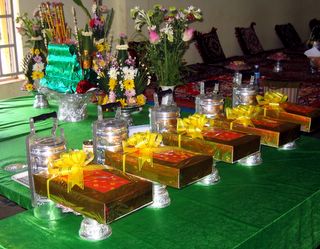
The chanting resumes and a monk who is seated in the middle starts to dip a handful of palm fronds in a chalice of water and flick the water over the kneeling crowd. Now I realise why they wanted the “important” guests to sit at the front, so they would be assured to get blessed by the water. The water, as Boreth later explains to me, is meant to represent cool, calm and cleanness. The monks are praying for the success of the company and for all those who are associated with the company. All five monks then reach for plates of flowers and throw handfuls of petals into the crowd. It is at this point that I realise why it is sensible to have a bowed head; yes for praying, but also to avoid being hit smack on the forehead with the small sweets that are mixed in with the flowers. No damage is done though.
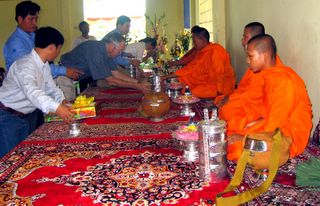
Sothat who I worked with in Prey Veng is seated behind me. “Anthea, have you been to Prey Veng recently?” he asks. I profess that I haven’t been to Prey Veng in a long time. “Me either” he responds shaking his head. Now that the project is over he no longer has his job there. “I miss there, I would like to go again soon”. I agree and tell him that I would too. I ascertain that the rains have come and that there has been enough water for farmers but not too much, as has been the situation in other Provinces which are now suffering from flood. It occurs to me that in my spare month coming up I could go stay in Prey Veng for a week or so. It would be a great end to my time in Cambodia – complete immersion. But I am not entirely sure how I would manage this, it would certainly be a last ditched attempt to combat my on-going sense of dislocation from Khmer people and Cambodia. Or more aptly the Khmer people and Cambodia that I first experienced in Prey Veng in early 2004. I have a sneaking suspicion that I am perhaps too comfortable in my small Phnom Penh world to really see this plot through.
After the ceremony we all congregate outside the centre where metal tables and chairs have been set up underneath a large tent. Already loud Khmer pop music is blasting from the wall of speakers piled up to the side of the tent. We sit down and a parade of meat dishes are brought before us. I sit and eat plain rice. A little later a plate of green mango and chilli is brought out. Happily, most people don’t notice my strange fare of green mango, chilli and rice, as in addition to the truckload of food, there is also a big bottle of Johnny Walker red label whiskey on every table. I look around and notice already several tables have finished their bottle. It is now around 11.30am.
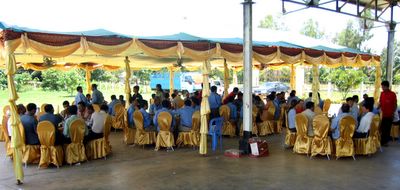
Shortly after the many-course meal is consumed the dancing begins. It is only men who get up and dance, wending their way around a table, rotating their hands slowing from the wrist. The whiskey seems to have done the trick and more men are forcibly hauled on the dance floor. There are few women who work for the company and they seem to be keeping well clear. The music is cranked up a notch louder. The new CEO of the company moves from table to table, clinking glasses, smiling and talking with the guests, among whom the local police, government departments are all represented. The ceremony and party has been a success. For some, the party is only just getting started, but for myself and my fellow barang colleagues it is time to leave. We pile into one of the project’s pick-ups and head back to Phnom Penh.
On the drive back I take in the Khmer country-side, so very familiar to me now, and listen to the conversation in the car. My colleagues have lived and worked in many countries all over the world, their discussions are littered with references to other places, cultures and experiences. A sense of being part of many places and peoples pervades. Yet they all have a home-base, although for some this is not where they were born or where there families are and much of their time is spent in other places. I realise how much of an impression Cambodia has made on me, this is not something that is easily going to be forgotten or removed once I leave. There will always be a sense of just touching the tip of understanding how things work here, but that said, I have absorbed so much of this place. I do know that I am ready to leave and the anticipation of this is perhaps making me more reflective.
We arrive back in Phnom Penh a little past one and I decide to take a wander down street 63 and find some food. My stomach could do with a little more than white rice and green mango for lunch. It is raining very gently as I leave, but the sun is out and shining brightly. As I walk down the street and shake my head to proffered moto lifts the rain starts to get heavier. I duck under the awning of a spare parts shop. I am perfectly happy just to stand and wait it out. I look around at the women sheltering like me, at the motos crawling down the street their riders covered in plastic ponchos. I am glad I am here, I wouldn’t want to have not come, but this is never something that is straight forward.
Today is a special day at work. We are all heading out to the Kandal seed centre for an opening celebration of the seed company. The event is to celebrate the four seed centres merging into one, and the fact that from the point of registration, the company will be a real company under Cambodian law. Our timing is perfect, we arrive just as the monks do. We are ushered into the seed centre which is a large warehouse with the seed processing and cleaning machinery and a small office upstairs at the far end of the building. A large blue plastic sheet has been laid down on the cement floor of the warehouse and a raised platform has been erected, covered in rugs where the five monks settle themselves.


I am invited to sit right at the front of the blue plastic. As usual, I would prefer to sit unobtrusively at the back, but my colleagues refuse. I notice that all the women are sitting at the front, as are all the barang. The chanting begins. The five monks are swathed in the usual bright orange cloth attire and sit quietly on the platform. In front of each is a silver plate with a glass, a bottle of water and a can of coke. I take in the incense, flowers, monks and coca cola. A curious milieu of religion, tradition and American commercialism.
The monks appear very young, ranging in age from around 8 to 18. The chanting continues, it is all in Pali. Containers of food and material are then distributed to guests. I am given a mock silver platter with a gift on top to hold. I am to keep my hands on the gift during the chanting and then we are instructed to offer the gifts to the monks. This is done and we all sit back down again.

The chanting resumes and a monk who is seated in the middle starts to dip a handful of palm fronds in a chalice of water and flick the water over the kneeling crowd. Now I realise why they wanted the “important” guests to sit at the front, so they would be assured to get blessed by the water. The water, as Boreth later explains to me, is meant to represent cool, calm and cleanness. The monks are praying for the success of the company and for all those who are associated with the company. All five monks then reach for plates of flowers and throw handfuls of petals into the crowd. It is at this point that I realise why it is sensible to have a bowed head; yes for praying, but also to avoid being hit smack on the forehead with the small sweets that are mixed in with the flowers. No damage is done though.

Sothat who I worked with in Prey Veng is seated behind me. “Anthea, have you been to Prey Veng recently?” he asks. I profess that I haven’t been to Prey Veng in a long time. “Me either” he responds shaking his head. Now that the project is over he no longer has his job there. “I miss there, I would like to go again soon”. I agree and tell him that I would too. I ascertain that the rains have come and that there has been enough water for farmers but not too much, as has been the situation in other Provinces which are now suffering from flood. It occurs to me that in my spare month coming up I could go stay in Prey Veng for a week or so. It would be a great end to my time in Cambodia – complete immersion. But I am not entirely sure how I would manage this, it would certainly be a last ditched attempt to combat my on-going sense of dislocation from Khmer people and Cambodia. Or more aptly the Khmer people and Cambodia that I first experienced in Prey Veng in early 2004. I have a sneaking suspicion that I am perhaps too comfortable in my small Phnom Penh world to really see this plot through.
After the ceremony we all congregate outside the centre where metal tables and chairs have been set up underneath a large tent. Already loud Khmer pop music is blasting from the wall of speakers piled up to the side of the tent. We sit down and a parade of meat dishes are brought before us. I sit and eat plain rice. A little later a plate of green mango and chilli is brought out. Happily, most people don’t notice my strange fare of green mango, chilli and rice, as in addition to the truckload of food, there is also a big bottle of Johnny Walker red label whiskey on every table. I look around and notice already several tables have finished their bottle. It is now around 11.30am.

Shortly after the many-course meal is consumed the dancing begins. It is only men who get up and dance, wending their way around a table, rotating their hands slowing from the wrist. The whiskey seems to have done the trick and more men are forcibly hauled on the dance floor. There are few women who work for the company and they seem to be keeping well clear. The music is cranked up a notch louder. The new CEO of the company moves from table to table, clinking glasses, smiling and talking with the guests, among whom the local police, government departments are all represented. The ceremony and party has been a success. For some, the party is only just getting started, but for myself and my fellow barang colleagues it is time to leave. We pile into one of the project’s pick-ups and head back to Phnom Penh.
On the drive back I take in the Khmer country-side, so very familiar to me now, and listen to the conversation in the car. My colleagues have lived and worked in many countries all over the world, their discussions are littered with references to other places, cultures and experiences. A sense of being part of many places and peoples pervades. Yet they all have a home-base, although for some this is not where they were born or where there families are and much of their time is spent in other places. I realise how much of an impression Cambodia has made on me, this is not something that is easily going to be forgotten or removed once I leave. There will always be a sense of just touching the tip of understanding how things work here, but that said, I have absorbed so much of this place. I do know that I am ready to leave and the anticipation of this is perhaps making me more reflective.
We arrive back in Phnom Penh a little past one and I decide to take a wander down street 63 and find some food. My stomach could do with a little more than white rice and green mango for lunch. It is raining very gently as I leave, but the sun is out and shining brightly. As I walk down the street and shake my head to proffered moto lifts the rain starts to get heavier. I duck under the awning of a spare parts shop. I am perfectly happy just to stand and wait it out. I look around at the women sheltering like me, at the motos crawling down the street their riders covered in plastic ponchos. I am glad I am here, I wouldn’t want to have not come, but this is never something that is straight forward.
